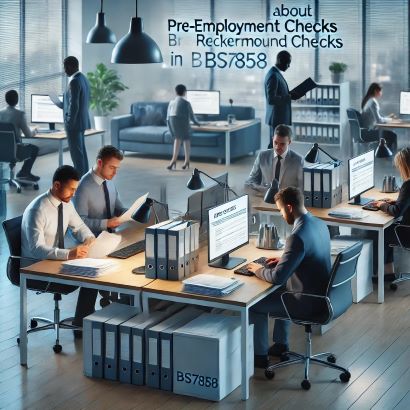

This typically encompasses various government departments, the defense sector, and private companies that handle sensitive information or deliver services under government contracts. Thus, it is imperative that organizations implementing digital BPSS processes adhere strictly to data protection laws and employ robust cybersecurity measures. The process of conducting BPSS checks is systematic and standardized to ensure consistency and thoroughness. right to work checks as well as a basic dbs checks are part of bpss clearance in the uk.
A crucial part of the BPSS clearance is the criminal record check, which helps identify any unspent convictions the applicant may have. AI and machine learning are increasingly being integrated into the BPSS process, enabling predictive analytics to assess risks associated with certain profiles or patterns.
The Data Protection Act (DPA) 2018, which incorporates the General Data Protection Regulation (GDPR) into UK law, is crucial in the administration of BPSS checks. If you have been self-employed, invoices to clients and bank statements showing payments received can serve as evidence.
While BPSS itself is not mandated by specific laws, it operates under the broader legal and regulatory framework that governs national security and employment practices in the UK. It's essential to be forthcoming with this information to facilitate a smooth and thorough BPSS clearance process.
In conclusion, digital technology has profoundly impacted the BPSS process by making it faster, more accurate, and more secure. Depending on the severity and nature of the crime, certain offenses may disqualify individuals from obtaining BPSS clearance. Addressing inconsistencies or gaps in the information provided by the individual undergoing BPSS clearance may necessitate additional time and effort to resolve.
This involves informing candidates that a BPSS check will be conducted, what the check entails, and what specific information will be gathered. Yes, you can fail a BPSS check if there are discrepancies in your identity verification, right to work status, criminal records, or employment history.
To continue accessing government assets, renewal of your BPSS clearance is necessary after this 3-year period. Delving into the intricacies of BPSS clearance can reveal a world of protocols, challenges, and future adaptations that are essential for maintaining security standards.
Transportation officials, especially those involved in overseeing or managing public transport security, require BPSS clearance due to the potential risks associated with transportation infrastructure and mass transit systems. For example, individuals who have frequently moved or changed jobs may require more extensive checks on their background, thus extending the process.
Posted by Jasmine Roberts on 2024-01-25

Discover BPSS requirements for IT and cybersecurity roles.
Posted by Jasmine Roberts on 2023-12-24
Posted by Jasmine Roberts on 2023-10-07

Discover what BPSS clearance is and why it's essential in the UK.
Posted by Jasmine Roberts on 2023-07-23
Posted by Jasmine Roberts on 2023-05-27
Posted by Jasmine Roberts on 2023-05-27
Posted by Jasmine Roberts on 2023-02-02
To secure BPSS clearance, it's imperative to provide the necessary documents such as proof of identity, employment history, national and immigration status, details on criminal records, and periods spent abroad. This is generally quicker than more detailed checks, such as those performed for higher levels of security clearance, but can still be delayed if there are issues with the national criminal records database or if the individual has spent significant time overseas. Cloud technology plays a pivotal role in the BPSS process by providing a centralized platform for storing and accessing data across different locations and devices securely.
Ensuring that all employees have been thoroughly checked and are legally allowed to work helps maintain the security standards necessary for sensitive roles, particularly in government and defense. This documentation can be critical in proving that the employer has diligently followed legal requirements should their compliance ever be questioned.
For roles where exposure to SECRET and TOP SECRET information is possible, BPSS clearance becomes even more significant in safeguarding classified data. The use of digital platforms in the BPSS process facilitates better communication and document management.
Moreover, digital technology supports ongoing monitoring and updating of BPSS clearances. By undergoing this screening, you not only demonstrate your trustworthiness but also contribute to maintaining the security and confidentiality of sensitive information within your organization.

BPSS checks typically include four main elements: identity verification, employment history check, right to work confirmation, and a basic criminal record check. These documents can include passports, biometric residence permits, national identity cards, and work visas. Automated systems can cross-reference and validate information against multiple databases in real-time, ensuring that discrepancies are quickly identified and addressed.
A key component of the BPSS check is the verification of documents, which can be time-consuming. In contrast, BS7858:2019 is tailored for roles where employees handle sensitive information, work in secure environments, or where there is a high requirement for trust and security integrity.
As technology evolves, it will continue to shape how Baseline Personnel Security Standard checks are conducted, promising even greater improvements in efficiency and security in the future. While DBS checks are significant for specific sectors like healthcare and education, BPSS is tailored for individuals with access to government assets and secret information.


BS7858:2019 checks, due to their more detailed nature, can take significantly longer - up to 12 weeks or more - as they require gathering more comprehensive information and thorough verification processes from multiple sources. The detailed guidelines of BS7858:2019 make it indispensable for security-sensitive industries looking to uphold the highest standards of reliability and safety. These documents serve as primary forms of identification and are vital in confirming who you are.
Ensuring that all employees undergo BPSS clearance before taking on roles that involve access to sensitive information is key to maintaining operational security and complying with national security regulations.

To guarantee a thorough evaluation of candidates, organizations typically follow these steps:Applicants need to provide documents like a passport or driver's license to confirm their identity. Employers must ensure that their BPSS processes comply with the Equality Act 2010, avoiding any form of discrimination based on protected characteristics during the vetting process. Completing BPSS successfully indicates that an individual has met the baseline requirements for trustworthiness and reliability, which are essential for more in-depth investigations.
While BPSS checks are used primarily as a pre-employment screening tool for government-related positions, DBS checks are broader and focus on determining an individual's suitability to work with vulnerable groups including children and adults. It's essential to provide accurate information and meet the trustworthiness standards to pass the screening process.
This step ensures that the individual has the right to work and is not illegally residing in the country, which is particularly important for maintaining lawful employment practices in sensitive environments.
Employment history checks are another key component of BPSS clearance, providing insight into an individual's work behavior and integrity. These components ensure that the individual is appropriately vetted for security-sensitive positions but do not delve into extensive criminal history unless necessary for the role. By vetting individuals' backgrounds, the government ensures that sensitive information remains protected from those who might misuse it.
Enhanced technological advancements are shaping the future landscape of BPSS compliance, offering quicker and more accurate identity verification processes. Have you ever wondered how this meticulous screening process impacts various sectors and the individuals involved?
BPSS clearance incorporates these checks, aligning with legal requirements to prevent illegal working and ensuring that all employees have the necessary authorization to work. Delays often occur during manual verification processes, impacting the overall clearance timeline.
This proactive approach helps organizations preempt potential security risks before they become problematic by analyzing trends and behaviors gleaned from past BPSS checks. Secure environment maintenance Employment History Validation A minimum of three years of employment history must be provided to complete the recruitment process.

BPSS Clearance is generally not transferable. Each employer may conduct its own vetting process to ensure compliance with internal security policies.
Renewal of BPSS Clearance depends on the employer’s policies and job-specific requirements. Some employers may require periodic reviews to maintain clearance validity.
Roles in IT security, government services, defense contracting, and public sector administration often require BPSS Clearance due to their access to sensitive information and secure systems.
Delays in BPSS Clearance can occur due to incomplete applications, missing documents, or extended reference checks. Applicants should ensure all information is accurate and complete.
Employers rely on BPSS Clearance results to make informed hiring decisions for sensitive roles. It helps ensure candidates meet security standards required for the job.
Once a BPSS application is submitted, the employer reviews the documents, verifies references, and conducts identity and background checks before granting clearance.
Government roles require BPSS Clearance to ensure that employees handling sensitive information are trustworthy, legally authorized to work, and free of disqualifying criminal histories.
Employers conducting BPSS screening must comply with UK data protection laws. Personal data is stored securely and used only for vetting purposes.